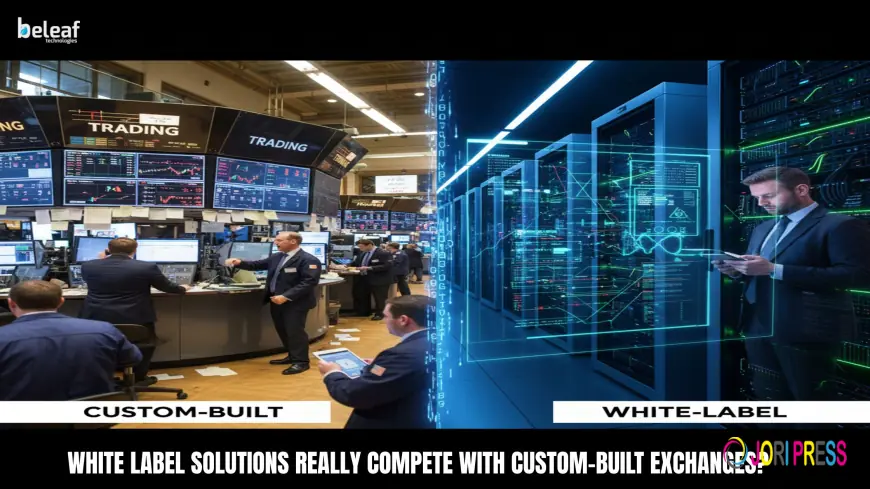Can White Label Solutions Really Compete with Custom-Built Exchanges?
Today, white label solutions are not only catching up, they're competing head-to-head with custom exchanges, delivering speed, cost efficiency, and advanced functionality without the traditional limitations.

In the dynamic world of cryptocurrency, innovation and speed often define who leads the market. Businesses looking to enter the crypto exchange space face one big question: should they build from scratch or adopt a white label cryptocurrency exchange solution?
For years, the assumption was that custom-built platforms offered more flexibility and power. But the reality is shifting. Today, white label solutions are not only catching up, they're competing head-to-head with custom exchanges, delivering speed, cost efficiency, and advanced functionality without the traditional limitations.
Understanding White Label Crypto Exchanges
A white label cryptocurrency exchange is a pre-built platform that allows businesses to launch their trading platform quickly by customizing the branding, user interface, and features to match their vision.
Instead of spending years developing an exchange from scratch, companies can deploy a ready-made solution that already includes essential features like:
-
Secure crypto wallets
-
Multi-currency support
-
Matching engine
-
KYC/AML integration
-
Admin dashboard
-
Liquidity management
This approach allows startups and enterprises alike to focus more on growth, user acquisition, and strategy rather than technical development challenges.
Why the Market Is Shifting Toward White Label Solutions
The crypto industry moves fast and timing can make or break a business. White label solutions are now the preferred choice because they eliminate lengthy development cycles while maintaining competitive quality.
Here’s why they’re gaining traction:
-
Faster Launch: Businesses can go live within weeks instead of waiting months or years.
-
Cost Efficiency: Development, testing, and maintenance costs are drastically reduced.
-
Proven Infrastructure: White label platforms are battle-tested for performance and scalability.
-
Enhanced Security: Reputed providers integrate multi-layered security protocols by default.
-
Focus on Branding: Businesses can dedicate resources to customer experience and market differentiation.
These advantages mean that white label exchanges are no longer seen as “shortcuts” but as strategic tools for sustainable market entry.
Feature Parity: White Label vs. Custom-Built Exchanges
One of the strongest arguments in favor of custom-built exchanges has always been flexibility: the idea that you can build anything you imagine. However, white label exchanges have evolved dramatically and now offer feature parity with custom solutions.
Let’s break it down into what really matters to an exchange operator:
-
Performance: Modern white label platforms use the same high-performance engines as custom ones.
-
Security: End-to-end encryption, DDoS protection, and multi-signature wallets are standard features.
-
Liquidity Integration: Many white label platforms now come pre-integrated with liquidity providers.
-
User Experience (UX): Businesses can fully customize UI/UX to reflect their brand identity.
-
Scalability: With modular architecture, scaling up is seamless as trading volumes grow.
In short, white label exchanges now deliver enterprise-grade reliability that rivals custom development without the steep investment.
When Speed Becomes a Strategic Advantage
In an industry where trends change weekly, being first to market is often more valuable than building everything in-house. White label solutions make it possible to capitalize on emerging trends like:
-
The rise of DeFi tokens and staking
-
Cross-chain interoperability
-
Institutional adoption of digital assets
-
Localized trading ecosystems in new markets
Businesses that wait too long on development often miss these waves. With white label solutions, speed becomes a competitive edge, allowing operators to adapt faster to market dynamics.
Flexibility and Customization: The Game Changer
Critics once believed that white label platforms lacked flexibility. But that’s no longer the case. The new generation of white label exchanges is built with API-driven modularity, allowing businesses to:
-
Add or remove trading pairs easily
-
Integrate external wallets or payment gateways
-
Customize user journeys and dashboard layouts
-
Implement advanced features like margin trading, futures, or staking
This flexibility gives businesses the best of both worlds speed and control without the risk of building from scratch.
Security — The Equalizer
Security has always been the biggest concern for exchange operators. However, white label platforms now come with bank-grade security protocols baked in, ensuring that businesses can operate confidently without developing their own systems from zero.
Typical security features include:
-
Cold and hot wallet segregation
-
Multi-signature authorization
-
Two-factor authentication (2FA)
-
Encrypted private key management
-
Regular third-party audits
This comprehensive protection means white label solutions can meet and often exceed custom-built standards.
The Cost Perspective: More Value for Less
Building a crypto exchange from scratch can cost anywhere between $300,000 to over $1 million, depending on features and complexity. Add maintenance, compliance, and infrastructure costs, and it becomes an ongoing financial challenge. White label solutions, however, provide the same functionality at a fraction of the price, making them ideal for startups and enterprises that prioritize ROI. This cost advantage doesn’t just reduce entry barriers it also enables faster scaling and experimentation in new markets.
The Verdict: White Label Wins Through Innovation and Agility
When it comes to competing with custom-built exchanges, white label solution are no longer the underdogs. They combine tested infrastructure with flexibility, cost efficiency, and unmatched speed to market. In fact, many of today’s successful crypto exchanges began as white label platforms and later scaled with custom add-ons proving that white label solutions can go toe-to-toe with fully custom exchanges and still come out ahead. The crypto landscape rewards adaptability, and that’s exactly what white label exchanges deliver: innovation without delay, performance without complexity, and scalability without compromise.
What's Your Reaction?
 Like
0
Like
0
 Dislike
0
Dislike
0
 Love
0
Love
0
 Funny
0
Funny
0
 Angry
0
Angry
0
 Sad
0
Sad
0
 Wow
0
Wow
0















































